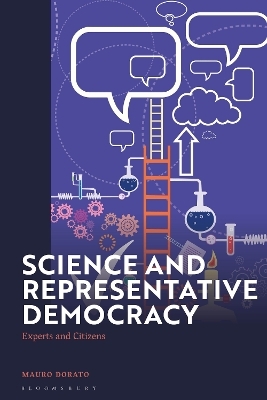
Science and Representative Democracy
Experts and Citizens
Seiten
2024
Bloomsbury Academic (Verlag)
978-1-350-27776-2 (ISBN)
Bloomsbury Academic (Verlag)
978-1-350-27776-2 (ISBN)
Mauro Dorato charts pressing debates within the philosophy of science that centre around scientific expertise, access to knowledge, consensus, debate, and decision-making.
This English-language translation of Disinformazione Scientifica e Democrazia argues that the advancement of science depends on an exponential process of specialization, accompanied by the creation of technical languages that are less and less accessible to the general public. Dorato reveals how such a process must align with representative forms of democracies, in which knowledge and decision-making ought to aim at the society’s general interest. Given the importance of the principle of competence, however, the role of experts as mediators of knowledge threatens the citizens’ autonomy of choice. Consequently, the risk of technocratic regimes calls for new ways to increase literacy about science and its philosophical and probabilistic foundations. Stressing the conceptual conflict between pluralism and conformism, Science and Representative Democracyreveals the obstacles to the functioning of both science and democracy.
This English-language translation of Disinformazione Scientifica e Democrazia argues that the advancement of science depends on an exponential process of specialization, accompanied by the creation of technical languages that are less and less accessible to the general public. Dorato reveals how such a process must align with representative forms of democracies, in which knowledge and decision-making ought to aim at the society’s general interest. Given the importance of the principle of competence, however, the role of experts as mediators of knowledge threatens the citizens’ autonomy of choice. Consequently, the risk of technocratic regimes calls for new ways to increase literacy about science and its philosophical and probabilistic foundations. Stressing the conceptual conflict between pluralism and conformism, Science and Representative Democracyreveals the obstacles to the functioning of both science and democracy.
Mauro Dorato is Professor of Philosophy of Science at Roma 3 University, Italy.
List of Figures
Acknowledgments
Introduction
1. Historical Prologue: The Lippmann–Dewey Debate
2. How Does Science Work? The Evaluation and Controllability of Scientific Hypotheses
3. How Does Democracy Work? The Balance of Powers
4. Representative Democracy, Direct Democracy, and Scientific Specialization
5. Scientific Disinformation and Distrust in the Experts
6. How to Navigate in the Disagreement of Experts: The Need for Greater Scientific Literacy
7. The Role of the History and Philosophy of Science in the Democratic Debate
Conclusion
Notes
References
Index
| Erscheinungsdatum | 03.09.2024 |
|---|---|
| Verlagsort | London |
| Sprache | englisch |
| Maße | 156 x 234 mm |
| Themenwelt | Geisteswissenschaften ► Philosophie ► Erkenntnistheorie / Wissenschaftstheorie |
| Geisteswissenschaften ► Philosophie ► Philosophie der Neuzeit | |
| Naturwissenschaften | |
| ISBN-10 | 1-350-27776-2 / 1350277762 |
| ISBN-13 | 978-1-350-27776-2 / 9781350277762 |
| Zustand | Neuware |
| Informationen gemäß Produktsicherheitsverordnung (GPSR) | |
| Haben Sie eine Frage zum Produkt? |
Mehr entdecken
aus dem Bereich
aus dem Bereich
die Grundlegung der modernen Philosophie
Buch | Softcover (2023)
C.H.Beck (Verlag)
CHF 25,20
Buch | Softcover (2023)
Reclam, Philipp (Verlag)
CHF 9,80

![Was heißt Denken?. Vorlesung Wintersemester 1951/52. [Was bedeutet das alles?] - Martin Heidegger](/media/113619842)
